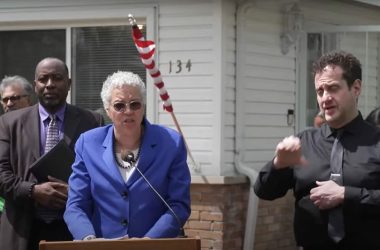Community organizers ask aldermen, media to get answers at Chicago Police budget hearings, likely to take place this week.
CHICAGO—(ENEWSPF)—October 14, 2014. Organizers with We Charge Genocide (WCG), a group fighting police violence and militarization, are asking their alderpeople and the media to give voice to Chicago’s communities during the city’s budget hearings by getting answers to a series of questions they posted online. Funding the Chicago Police Department (CPD) accounts for a huge portion of city public spending: 41%, compared to the only 2% of the city budget that goes to community services, according to the 2014 City of Chicago Annual Financial Analysis.Chicago also has the most police officers per capita of any major city.
The City’s Budget process will kick off on October 15th with Mayor Rahm Emanuel’s address. After the Mayor releases a budget summary, individual city departments have hearings before the City Council. The CPD usually goes first, so it is expected that the CPD hearing will be before the Council this week.
Below is a set of questions community members from across the city, harshly impacted by under-funded public services and an over-funded, militarized police force, are asking alderpeople and the media to obtain answers to. Alderpeople are being encouraged by their constituents to ask these questions during the CPD budget hearings. WCG hopes the media will use these questions as well to get to the bottom of Chicago’s bloated police spending.
Militarization & Budget:
1. How does CPD determine the allocation of military-grade equipment within the department?
2. What stations or units currently possess military-grade equipment in CPD?
3. What additional training is provided to CPD officers/units/stations in possession of military-grade equipment provided through federal programs such as LESO 1033?
4. What is the total value and make-up of the military-grade equipment in CPD’s possession?
5. Can CPD, at this moment, provide a coherent explanation for the necessity of military tools on a city street?
6. What amount of the CPD budget is allocated to maintain the equipment and train officers in the use of the military-grade equipment in their possession?
7. What percentage of the budget is utilized for SWAT team training, equipment, and deployment?
8. What grants has CPD historically been awarded or applied to from the Homeland Security Grant Program (HSGP) and its two main components, the State Homeland Security Program (SHSP) and the Urban Areas Security Initiative (UASI)?
9. Does CPD routinely and accurately collect and provide the relevant data to assess factors, such as race, gender, and age in stop-and-frisk interactions, much like New York and comparable cities do?
Additional Questions:
1. What steps are being taken to identify and investigate officers with well-documented patterns of misconduct by the IAD?
2. What resources and/or training does CPD receive from outside organizations (like the DOJ etc) on these matters?
3. Does CPD notify any oversight agency if and when CPD changes crime codes or training protocol? If so, whom? If not, why not?
4. What progress, if any, has CPD made towards fully implementing the following policies:
a. Administrative Notices of Violation (ANOVs, or issuing tickets for low-level narcotics possessions);
b. General Order G02-01-03: Interactions with Transgender, Intersex. Gender Non-conforming Individuals; and
c. Special Order S06-14-03: Responding to Incidents Involving Citizenship Status?
5. How often, if at all, does CPD review its Use of Force policies and training? And if so, what’s the nature of these reviews? What changes have resulted from these reviews?
6. What steps, if any, has CPD taken to address issues regarding the accuracy of CPD’s crime reporting raised by the Office of Inspector General and the Chicago Magazine?
7. How many officer complaints does IAD receive, both from the general public and from city offices, including IPRA, 311, OIG, and others? Why does CPD not make this data public?
a. Would CPD be willing to make its IAD investigative policies and procedures available to the public? If so, why haven’t you done so? If not, why not?
8. Does CPD notify any oversight agency if and when CPD changes crime codes, including but not limited to homicides to death investigations or homicides to assaults or aggravated assault to simple assault, etc.? If so, who? If not, why not?
9. What steps is CPD taking to reduce the amount of overtime officers work? (What is the break down for overtime of administrative / supervisors v. patrol / beat officers?)
10. The leading cause of arrest in Chicago is misdemeanor marijuana possession at 44 arrest per day. What specific policies is CPD currently implementing to end this practice?
We Charge Genocide is volunteer-run by Chicago residents concerned that the epidemic of police violence continues uninterrupted in Chicago who seek to equip individuals across the city with tools to more proactively hold police accountable. In November, the group is sending six youth organizers to the United Nations in Geneva, Switzerland, to present a report on Chicago Police violence before the Committee Against Torture. The name We Charge Genocide comes from a petition filed to the United Nations in 1951, which documented 153 racial killings and other human rights abuses, mostly by the police.
Source: wechargegenocide.org








